The Biblical Mind
The Biblical Mind is dedicated to helping its audience understand how the biblical authors thought, promoting Bible fluency through curious, careful reading of Scripture. It is hosted by Dr. Dru Johnson and published by the Center for Hebraic Thought, a hub for research and resources on the intellectual world of the Bible.
The Biblical Mind is dedicated to helping its audience understand how the biblical authors thought, promoting Bible fluency through curious, careful reading of Scripture. It is hosted by Dr. Dru Johnson and published by the Center for Hebraic Thought, a hub for research and resources on the intellectual world of the Bible.
Episodes

Friday Feb 23, 2024
Will AI Take Over the World (Adam Graber)
Friday Feb 23, 2024
Friday Feb 23, 2024
Appropriately: An AI generated summary of our conversation:
The conversation explores the influence of technology on humanity and the reciprocal relationship between the two. It discusses the impact of smartphones and identifies key technologies that have shaped the world. The balance between screen time and creativity is examined, along with the concerns and benefits of AI. The importance of foundational knowledge and skills is emphasized, as well as the need for critical evaluation of sources. The conversation also addresses the biases present in AI systems and the challenges of tracing causal links within them. The conversation explores the use of AI in data analysis and interpretation, particularly in the context of Bible study. It raises questions about the validity and limitations of using AI for interpretation and emphasizes the need for critical evaluation.
Takeaways
AI can analyze vast amounts of data and identify correlations that humans may not be able to perceive.
The use of AI for interpretation in Bible study raises questions about the validity of a statistical method of interpretation.
AI interpretation should be seen as one mode of interpretation among others, rather than a replacement for traditional methods.
The scholarly community needs to critically evaluate the use of AI for interpretation and develop educational programs to address its implications.
Chapters
01:31 The Influence of Technology on Humanity
03:26 Technology Shaping Our Experience
04:21 Examples of Technology
06:23 The Relationship Between Technology and Humanity
09:27 The Impact of Smartphones
10:48 Technologies that Have Changed the World
13:24 Balancing Screen Time and Creativity
16:09 The Concerns and Benefits of AI
19:52 The Role of AI in Creativity
25:09 The Importance of Foundational Knowledge and Skills
27:48 The Biases of AI Systems
31:34 The Human Element in AI Systems
36:26 The Need for Critical Evaluation of Sources
39:43 The Human Bias in AI Systems
40:26 The Concerns about Tracing Causal Links in AI
41:29 AI and Data Analysis
42:27 Statistical Method of Interpretation
43:57 Critically Evaluating AI Interpretation
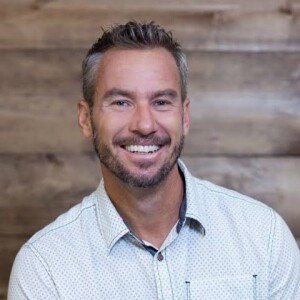
Wednesday Nov 29, 2023
Scripture, Sexuality, and Podcasting (Preston Sprinkle)
Wednesday Nov 29, 2023
Wednesday Nov 29, 2023
In the first half of this episode, Dru Johnson talks with Preston Sprinkle about his journeys into the LGBTQ+ communities, theologies, and conversations and the psychological research in that field. He also discusses his convictions about biblical views on sexuality that emerged from this quest.
In the second half of this episode, Preston and Dru talk about the theology (and ecclesiology) of podcasting itself. Who should and should not be doing it, and what cautions should they be employing.
Audio editing by Nate Spanos.

Tuesday Nov 14, 2023
Why We Need the Global Church (Stephen T. Pardue)
Tuesday Nov 14, 2023
Tuesday Nov 14, 2023
In this episode, we discuss Stephen T. Pardue's newest book Why Evangelical Theology Needs the Global Church.
![Are Psychedelics Good for Depression, or Anything at All? (Ben ”Doc” Askins) [Full Episode]](https://pbcdn1.podbean.com/imglogo/ep-logo/pbblog5306974/cb1e45_85b4ad2ff2d7490f84186e85c14a2ef2_mv2_copy_vmwgcd_300x300.png)
Saturday Oct 21, 2023
Saturday Oct 21, 2023
Audio editing (and strategic bleeping) by John Viinalass.
In the first half of this extra long episode:We discuss the strange biography of Ben "Doc" Askins, from combat medic to seminary student to Army physician's assistant (PA) to Psychiatric PA researching psychedelic medicine and trauma.
In the second half of this extra long episode:
We discuss if there is an appropriate roll for various drugs, including psychedelics and MDMA, in assisting the dying, integrating traumas, and more. We also figure out what a "bad trip" on LSD might be.
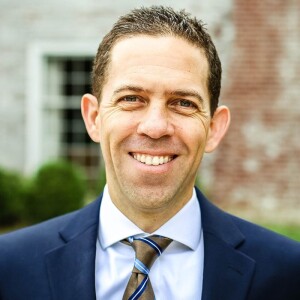
Wednesday Aug 30, 2023
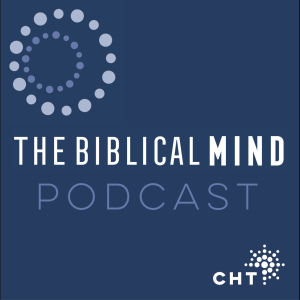
Friday Jul 28, 2023
A Bend in the Road for TBM and CHT, and Farewell Celina!
Friday Jul 28, 2023
Friday Jul 28, 2023
The Biblical Mind and the Center for Hebraic Thought are entering a new phase after ending a formal partnership with The King’s College. Additionally, CHT director of operations and TBM editor Celina Durgin will leave her position at the center on July 28, 2023.
In this mini episode, Dru and Celina provide a bit more context, and Celina bids the CHT goodbye and shares a little about where she's going next.
The Biblical Mind magazine and podcast will keep publishing during this transition, though less frequently and regularly than it had been until recently. The CHT’s other partnerships and affiliations will be unaffected. We hope and pray for a new partnership to allow the CHT to emerge from its period of dormancy and resume full programming in the coming months. Thank you for continuing to follow us.

Friday Jun 30, 2023
’Fireside’ Chat: Distance between Seminaries and Churches (Matt LaPine)
Friday Jun 30, 2023
Friday Jun 30, 2023
Dru enjoys a more casual conversation with Matthew A. LaPine (PhD, Trinity Evangelical Divinity School), pastor of theological development at Cornerstone Church and lecturer at Salt School of Theology (Ames, Iowa). Their chat covers theological and pastoral education, considering the in-house models of megachurches and the ways in which seminary can be disconnected from the reality of church life.
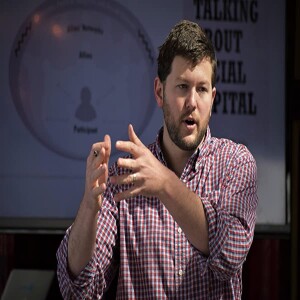
Friday Jun 09, 2023
Is ’Systemic Injustice’ Biblical? (Michael Rhodes)
Friday Jun 09, 2023
Friday Jun 09, 2023
Terms like "systemic sin" or "structural injustice" immediately make many people think of contemporary ideologies that they either strongly embrace or strongly oppose, such as socialism or the much-discussed (but poorly understood) critical race theory. These charged terms are often employed in vague or unhelpful ways.
The Bible has many examples of sin and injustice that are not purely individual—of evil that is bigger than the sum of the evildoers, and iniquity that reverberates through generations. How can we think more clearly and biblically about the nature of evil and injustice? Sin is many things in Scripture: an action, an identity, an agent or power, and the brokenness of structures and systems. People err when they don't grasp the Bible's full, complex picture of sin.
Michael Rhodes (PhD, Trinity College Bristol/University of Aberdeen) is a Lecturer in Old Testament at Carey Baptist College. He is an ordained minister in the Evangelical Presbyterian Church, author of Formative Feasting: Practices and Virtue Ethics in the Deuteronomic Tithe Meal and Corinthian Lord’s Supper (2022), and co-author of Practicing the King’s Economy: Honoring Jesus in How We Work, Earn, Spend, Save, and Give.
Show notes:
00:26 Unjust kings don't act alone; the state is more than the sum of its parts
06:46 The positive side: people were created to be mediators of God's blessing
12:34 English hides the second-person plural
14:32 The structures of society create incentives and disincentives for behaviors
15:38 Intergenerational sin in Scripture
18:14 People's inconsistent resistance to the idea of systemic injustice and sin
22:49 What is sin? It's both individual and communal, personal and systemic
31:10 Is this leaning toward socialism or critical race theory?
41:06 Cornel West for president?
41:56 Exercising power faithfully in different kinds political, economic, and cultural contexts
43:48 Paradigmatic depictions of God's kingdom should be announced and emulated in the church
Show notes by Celina Durgin
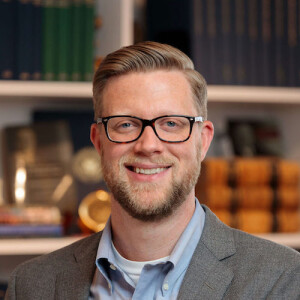
Monday Jun 05, 2023
Technology Isn’t a Neutral Tool (Jason Thacker)
Monday Jun 05, 2023
Monday Jun 05, 2023
From social media, to the printing press, to artificial intelligence, to the pencil, technologies have often been regarded as things that can't be good or bad apart from how people choose to use them. Jason Thacker doesn't think any technology is merely a neutral tool, because as people use technology to shape the world, it also shapes them and their culture.
Jason Thacker serves as an assistant professor of philosophy and ethics at Boyce College in Louisville, KY. He also is a research fellow in Christian ethics and director of the research institute at The Ethics and Religious Liberty Commission of the Southern Baptist Convention. He is the author of several books including Following Jesus in the Digital Age and The Age of AI: Artificial Intelligence and the Future of Humanity.
He is a graduate of The University of Tennessee in Knoxville, where he earned a Bachelor of Arts in Communication Studies. He also holds a Master of Divinity from The Southern Baptist Theological Seminary, where he is currently a PhD candidate in ethics, public theology, and philosophy.
Show notes:
00:26 What is technology?
04:25 Jacques Ellul on "technique" and how technology forms us
08:19 Two views of technology: instrumentalist and deterministic
16:05 Optimism, pessimism, and realism about technology
22:27 Some tools don't have good uses
28:23 A biblical theology of technology?
31:54 Technology and the vulnerable
Show notes by Celina Durgin
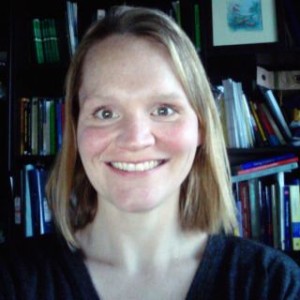
Friday May 05, 2023
ICYMI: How ’Christianese’ Is Like Corporate Jargon (Valerie Hobbs)
Friday May 05, 2023
Friday May 05, 2023
This episode was originally published in May of 2021. We thought it was worth a reissue for our newer listeners. A new episode is coming next week.
Why do we say "come to Jesus"? This Christianese phrase doesn't just show up in church—it shows up in offices, homes, and schools around America, where we speak of "come-to-Jesus moments." What about words like "community" or "intentional"? Do we even know what those words mean? Unless we attend to our words and try to express our thoughts more carefully, our religious language can end up thin, impotent, and laden with clichés.
In this episode, Dru Johnson talks to Dr. Valerie Hobbs, a Senior Lecturer and linguist at the University of Sheffield. Dr. Hobbs specializes in the construction, use, and progression of religious language in contemporary discourse. They discuss the definitions and origins of religious language and Christianese, and how they can be distinguished from simple "in-group" or technical language. Then, they consider how our most powerful (or just persistent) ideas about death, God, and spirituality find their way out of the church and into corporate discourse, or vice-versa. They conclude with remarks on how to think about prayer, apologizing, and even the idea of racial reconciliation, to help us choose better words and think more deeply.
Show notes:
0:00 Defining “religious language” and "Christianese"
2:18 How religious language is constructed
4:26 The difference with in-group language
6:37 Religious language in the secular world
9:27 Corporate discourse and our values
13:25 Where we get our Christianese clichés
19:09 Learning how to express our experiences
23:43 Becoming sensitive to the way we speak
26:47 Apologizing
29:30 The problem with terms like "racial reconciliation"
Learn more about Valerie Hobbs and her work.
Her most recent book, An Introduction to Religious Language
Show notes by Micah Long.
Credits for the music used in TBM podcast can be found at: hebraicthought.org/credits.






